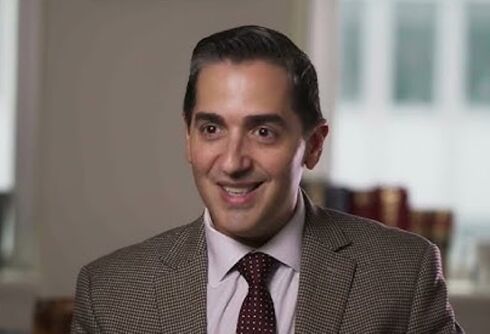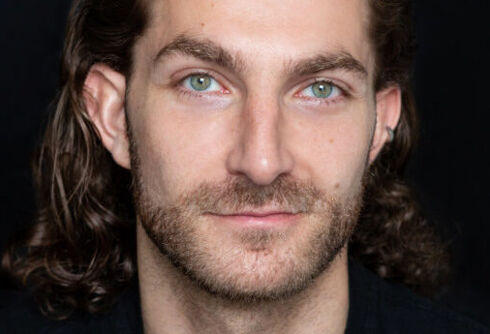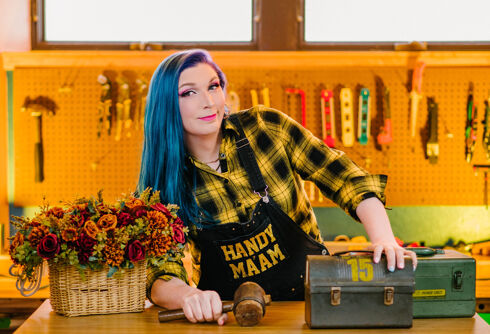In April, worldwide news agency Reuters named Gina Chua as their new executive editor. On its face, it was just another tidbit to include about media hires and promotion. Chua is certainly qualified, having worked as a reporter for over 35 years both from New York and as a correspondent in locations across Asia.
Yet, as often proves true in journalism, the real story is in the details. With her new title, Chua is now considered the most senior journalist in a major news organizations in the country — and possibly much of the world — that is transgender.
Related: Don Lemon opens up about walking through fire to become one of the nation’s top news anchors
At the time, Chua’s promotion to the newly-created role at Reuters was one of the first executive decisions by the agency’s new editor-in-chief, Alessandra Galloni. Galloni, in turn, is the first woman atop the editorial staff of the news agency known for its global newswire service transmitted to websites and publication across the world. Chua, a career journalist and trans woman of color, essentially becomes number two in command.
Never Miss a Beat
Subscribe to our newsletter to stay ahead of the latest LGBTQ+ political news and insights.
“My life is meetings. All it is are meetings. I’m a bureaucrat,” Chua laughed to LGBTQ Nation in the middle of one of her work days. “It started at 7:00 am this morning and I’m still going. Yesterday it was 7:45 am, and I finished at 6:00 pm. So, yeah, that’s my life, which is like, standing in front of a damn screen all day long.”
She reflects, “yeah, it’s been good.”
Chua has started going back to the office on a day-to-day basis, but more frequently as of late, and assuming “there’s no second wave, third wave, fifth wave, whatever wave it is” Reuters‘ New York based staff will plan to return to their offices at a 50% capacity eventually.
“It’s been good that way to let me have a chance to kind of get used to this skin, which is great,” she said.
Chua’s career started in Singapore, where she was born. After starting out as a writer for the country’s state-funded broadcast company, and earning her master’s at Columbia University, Chua first worked for Reuters as a correspondent beginning in 1988.
From the 1990s and until 2006, Chua worked from all around Asia — Manila, Hanoi, Hong Kong — before relocating permanently in New York as a senior editor at the Wall Street Journal.
In 2009, with the news industry’s shift from print-first to digital-first on the horizon, she went back to Hong Kong as the editor-in-chief of the South China Morning Post. 250 staffers and an annual budget of $20 million were under her control, so Chua’s used to all the “boring stuff” that comes with being a managing executive in a newsroom.
She returned to Reuters, and New York, in 2011. Although she’s a well-travelled, world-acclaimed writer, that and turning 50 set the stage for Chua to learn about something new: herself.
When she first came back to the states, she never thought she’d be able to come out. By the time the pandemic rolled around, Chua was 60 and Reuters‘ global managing editor, and that all changed. The journey was slower and much different from many others, but she eventually became comfortable in her true self.
In December 2020, Chua came out to Reuters staff in an email: “I’m transgender. And beginning today I’ll be living and presenting as what I know to be my true self 100 percent of the time.” That was that.
Some news about me – and also proud to fly the trans flag at Reuters. https://t.co/u79R89feMt
— gina chua (@GinaSKChua) April 21, 2021
Chua reflected to LGBTQ Nation, “It’s been fantastic. Just getting the emails from people, just hearing from other voices, that’s really been the best.”
She hopes her story becomes a source of inspiration for other trans people around the world, including in media. The news of her promotion alone certainly served as a bright spot in a year where nearly every story or report about trans people across the news industry has been about something negative. Since last year, anti-trans activists have worked hard, both online and in real-life policy-making, to reverse the progress made for the rights of trans people over the last decade.
Despite their efforts, trans people continue to change the world, making a difference by standing loud and proud in all corners of the world. Chua’s title brings that difference-making change to the media industry itself, which has struggled with accurately depicting or reporting stories about trans people altogether.
Chua’s story gained widespread admiration when she was profiled during Pride Month in the New York Times, among other publications.
“I said in the Times article somewhere, you know, ‘There are a lot of people who are 14 years old who would like to know that this is not a death sentence,'” she recalled.
“The reason I said that was, I went to a leadership thing two years ago, and there was this guy maybe in his sixties who was literally crying. Pete Buttigieg’s husband, Chasten, was speaking at this event, and this guy doing the introduction, sort of really started tearing [up] on stage.
“He said, ‘you know, if I had known at 14 that this was OK, that I could grow up and come out, it would have changed my life dramatically.’ And that stuck with me,” Chua said.
“So I think, if I have an opportunity that I have a responsibility to show people that — and I hate to say it, but touch wood — but it’s not a death sentence. You can do this and you can have a full and rich life.”
A nice profile of me in the @nytimes: https://t.co/S5h5PhX6en
— gina chua (@GinaSKChua) June 4, 2021
It’s already documented that entertainment has long failed to depict trans people in a way that’s not negative or demonizing (as in, stories where they’re the victim or the villain). Cable, radio, and podcast news media has not been much better, especially in traditional or conservative media.
That problem also translates into written news media and journalism. GLAAD recently rated several mainstream news publications in their coverage of LGBTQ people, and top institutions for journalism failed.
The New York Times was one of those failing institutions. Chua’s profile, while generally well-received, also earned some criticism for how the story used language that was considered out-of-date in reference to trans people. That tracks with how much of the Times‘ coverage of trans people is received.
The NYT loves to share images of trans people at marches but consistently refuses to write about trans people with any care. Contesting our existence in written debate is not absolved by sharing images of protest.
— Chase Strangio (@chasestrangio) June 15, 2021
Chua understand that representation alone, especially in journalism, is not the end-all to the problems facing marginalized people around the world, including LGBTQ people.
“I think it’s incumbent on newsrooms to better reflect the world that we’re living in. And that’s partly driven by more representation in newsrooms. But it isn’t enough, right?” Chua told LGBTQ Nation.
“So what really matters is that you can build a culture where people understand that their view isn’t the only view. Acknowledging that yes, they have a view. You have a lived experience, I have a lived experience. I bring all of that to the table, and it’s not wrong. But it’s also not the only right.”
Chua implores journalists to reevaluate how they write about marginalized people.
“At the end of the day, I think the real question is how well do you serve the community that you say you are serving? Now serving them well doesn’t mean telling them what they want to hear. Serving them well means giving them the information that they need.”
She adds, “I think what journalism should be doing is showing the basic humanity of people, frankly, on whatever side of the political divide, whatever side, you know, whether they’re for or against any issue.”
Journalism is still an industry plagued with addressing its own issues, let alone other issues adequately. While representation and balance are topics of importance right now, the freedom of press remains in jeopardy in many corners of day-to-day life around the world.
Just last week, Reuters’ own Pulitzer Prize-winning photojournalist Danish Siddiqui was killed while reporting on the Taliban from Afghanistan.
'I shoot for the common man': @Reuters journalist Danish Siddiqui was killed covering clashes near the Pakistan border. Here is some of his finest work: pic.twitter.com/kIxgKE2Dgt
— PR Team at Reuters (@ReutersPR) July 16, 2021
While Chua’s job now is currently very bureaucratic, there are many serious issues she and other newsroom leaders face today, possibly with more world-changing implications than ever.
She’s written extensively about “rethinking” journalism on her personal website, has taught current and future journalists around the world as an instructor, and, like many in media, even tweets frequently about the industry.
Now, Chua is in a unique position of influence, and she understands the responsibility that comes with that.
“Reuters is a very particular place because we sell to all kinds of news organizations. We sell to Fox News, we sell to The Guardian,” she said, “and, how do you sell the same news to both people, unless you’re walking a really clear middle path? What I would say is that if you want people to trust you in news, they have to trust that you came in with an open mind.”
Clearing up the distinction between objectivity and humanity is an important component to that.
“Yes, you may be in favor of this or you may be in favor of that. And I think, you know, the notion that journalists [have to] pretend, ‘I don’t have a view,’ is difficult. You want to be able to say ‘No, I’m for whatever, I’m for combating climate change, for example. I believe it’s real.’ That’s a point of view that some people might disagree with, but if you can come in and convince people that you came in with a genuine open mind — that you examined all of the things — that’s what it comes down to.”
Chua thinks that “wherever you are in the spectrum between objectivity to advocacy, I think the critical thing is always to say that every time you come to an issue, you are prepared to be persuaded that you were wrong. And if you can do that and people genuinely believe you, then I think you’ve done your mission well.”
She’s “less interested in the debate about objectivity and more interested in the debate about open mindedness. How do you show you’re open minded? How do you be transparent about that is more important.”
One time at Reuters, Gina canceled a meeting I had done a lot of prep for so I was a little bummed.
Then I found the reason was for her to fly to Myanmar to negotiate the release of 2 journalists held captive.
Very cool to see her in the Times today https://t.co/uwPDNaTwVM
— Max Lockie (@staphwriter) June 4, 2021
No matter where people stand on issues, one thing that is paramount to improving the world in the times to comes, Chua believes, is improving media literacy.
“I think people need to understand what the role of the media is a little bit better,” Chua explained. “I wish I knew there was a way to explain that, or wave a magic wand to make that happen. I think when people who say, ‘I don’t like the news because it doesn’t reflect what I said,’ and I don’t think that is a fair comment. But I do think it’s fair for people to say ‘I don’t trust the news because it doesn’t reflect my experience’.”
A similar lack of foundational understandings has caused issues between some in the LGBTQ community. Having reported on the world from the mid-1980s until today, Chua has seen that schism many times before.
“The way I look at it is, the arc of history bends towards justice and sometimes there’s setbacks. But, fundamentally I mean, if you look at the progress on something on gay and lesbian rights over the last 30 years, I think a lot has changed — and for the better,” she recounts.
“Which is not to say things are perfect, not to say there’s not discrimination out there, but, ask a gay man what it was like in the 1950s versus what it’s like now. I think he’ll say it’s night and day, even though he wishes there was more progress. So I think that’s really kind of the frame to look at it and say that I think that there’s progress, there’s more visibility.
“Yes, it’s true that trans people in particular are the center of a debate right now. But, I am optimistic and confident that over time, you know, that will change in the same way.”
Chua points to the fact that a majority of people have come around to accept marriage equality. “Even a majority of fairly conservative people support that. So I think that notion of normality has kicked in,” she said.
There’s also an inability to respect marginalized people, and bring intersectionality to reporting on them.
“I think that a fair amount of those stories tend to relay us, especially on LGBTQ issues, as victims. I mean, frankly that’s true of racial justice stories as well. You know, where they say, ‘oh, this poor community or these poor people, isn’t it terrible what happened to them?’
“They’re not unsympathetic. They really would like things to change. But they need to to give agency to those people, treat them as people and show them in the fullness of their life, good and bad,” she said. “I don’t think, particularly, gay people or trans people or frankly, any other people, want anything special. What they want is they want to be treated like people. And I do think that we’re on the path to that. At least I hope so.”
Chua likely understands how long it can take to cross a path more than anyone.
She surmises that the change will come “As people see each other as real people. I mean, maybe I’m naïve, but I’m hoping for progress that way.”
Now, less than a year since coming out at work, the pandemic has allowed her to still take things slow as she grows accustomed to her new role.
Despite the publicity, and her high-profile work, she’s currently experiencing normalcy. There are many good moments, she shared.
“My partner and I have eaten more meals together, had more walks together. It’s been good that way to let me have a chance to kind of get used to this skin, which is great. And going back to the office is nice.”
She’s working on “sort of a zillion different projects here and there,” but her primary directive as the executive editor is “engaging with audiences and trying to make our stories, what we call ‘the file,’ more diverse, more inclusive, more representative of the community, and more representative of the world.”
All the correspondence she’s gotten has been overwhelmingly positive and inspiring. One child who’s best friends with another trans child wrote to her.
“Now here’s a story we can tell her that gives her hope,” Chua said. “I’ve really come to understand, in a way that I sort of intellectually understood but didn’t really grasp the importance of, visibility.”
When asked, Chua couldn’t think of any “bad” parts about her “15 seconds of fame.” Although there are many negative things going on — including the ongoing pandemic, she stressed that no one should “underplay the impact,” herself included, that there haven’t been any negative moments in her life since her coming out:.
“I’m hoping there’s no really bad ones. So fingers crossed on that too.”
The best part about it, she told LGBTQ Nation, is just that — the normalcy.
“Just normal life,” she said, “just walking out and going to do the laundry and not having to think about anything about what anybody else is thinking about, not having to listen at the front door to see that somebody there is sneaking out of the building, those are the best moments.”
Don't forget to share:














